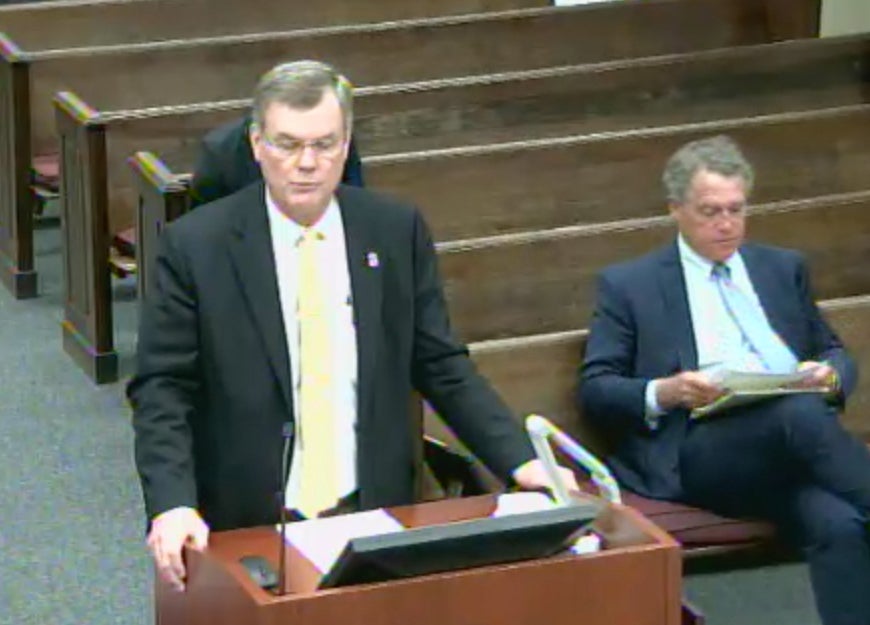IW Supervisors go forward with meeting
Published 7:06 pm Tuesday, March 31, 2020

- County Administrator Randy Keaton updates the Isle of WIght Board of Supervisors on transportation-related projects from the lectern rather than his usual seat at the dais. Board Chairman Joel Acree said this was so board members could socially distance themselves from each other. Seated behind Keaton is County Attorney Bobby Jones Jr., who was also not at his usual seat at the dais. Courtesy | Isle of Wight County
|
Getting your Trinity Audio player ready...
|
ISLE OF WIGHT
Two weeks ago, Gov. Ralph Northam urged Virginians not to gather in groups of more than 10 in an effort to slow the spread of the novel coronavirus (COVID-19) through the commonwealth. Despite this, Isle of Wight County’s Board of Supervisors went ahead with its regular scheduled meeting on Thursday, March 19, albeit with a few changes.
For one, County Administrator Randy Keaton and County Attorney Bobby Jones Jr. were seated not at their typical places at the dais, but rather in the rows of benches normally reserved for the audience — with board members using the extra space at the dais to distance themselves from each other. The second notable change was the lack of attendees other than county staff, save for one citizens’ time speaker — Herb DeGroft — who, unfazed by coronavirus concerns, advocated as he had in the past for the funding of school resource officers at each of the county’s five elementary schools.
According to Board Chairman Joel Acree, both changes were the result of the county’s efforts to implement social distancing — this being the practice of isolating oneself from others to slow the spread of an infectious disease like COVID-19. While Jones had reportedly advised the Board that government business meetings were currently exempt from Virginia’s ban on large groups, “We realized [the governor’s] recommendations are there for public safety and based on experts’ advice,” Acree said. “We wanted to take precautions by limiting the number of people in the room.”
Southampton County and the City of Franklin, both of which border Isle of Wight, had each cancelled their regular in-person governmental meetings scheduled for later in March, and all three localities have closed their offices to the public. Acree, however, said that while there was a similar discussion among Isle of Wight’s supervisors as to whether or not to cancel its meeting, the board ultimately decided to go forward.
“There was business we had to conduct,” Acree said, most importantly, voting on the county’s declaration of a state of local emergency. As previously reported, this allows localities to begin purchasing whatever equipment and supplies it will need to maintain services to residents during the emergency, in this case, the COVID-19 crisis.
According to a Friday, March 20 Virginian Pilot article, Isle of Wight County is not alone is not alone in wanting to make changes to how it handles government business in light of the coronavirus scare. Several public officials, including some in the General Assembly, have advocated for Gov. Northam to issue an executive order allowing cities, and presumably also counties, to hold virtual meetings.
“We’re looking at our options,” Acree said, referring to the possibility of conducting county business remotely. “We need to still get that interaction with constituents during meetings, as well as hold hearings on other matters.”
The Board, Acree said, is working closely with county staff to evaluate what other options are available to the county, and what would be legal with regards to state and federal Freedom of Information Acts. Megan Rhyne, executive director of the Virginia Coalition for Open Government, is quoted in the Virginian Pilot article as having stated that Virginia allows virtual meetings during state of emergency declarations, but only to take action related to that particular emergency. However, drafting and funding a budget, which cities and counties would ordinarily be starting around now, would typically not be something localities can do virtually without a change from the General Assembly or possibly the governor, according to her comments to the Pilot.
Virginia Attorney General Mark Herring has since issued an advisory opinion stating that Virginia law allows public bodies to conduct meetings electronically if “the purpose of the meeting is to address the emergency,” which includes meeting “to make decisions that must be made immediately and where failure to do so could result in irrevocable public harm.” Herring, however, clarifies the General Assembly does not permit public bodies to handle all business through electronic communication, even during a declared emergency.
“Public bodies should carefully consider whether taking a given action taken during a meeting held by electronic communication means is truly essential and should defer any and all decisions that can be deferred until it is once again possible to meet in person,” Herring writes.
Northam, last Monday, then issued Executive Order No. 53, which, among other measures to reduce the spread of COVID-19, closed all K-12 schools through the end of the school year, banned gatherings of more than 10 people and ordered non-essential businesses to close. The order took effect at 11:59 that evening and will remain in effect at least through April 23. Businesses in violation of the order may be charged with a Class 1 misdemeanor, though brick-and-mortar retail businesses not explicitly deemed essential in the governor’s order may continue to operate if they limit all in-person shopping to no more than 10 people and follow social distancing guidelines. The order then clarifies that none of the new restrictions will limit the provision of health care or medical services, access to essential services for low-income residents such as food banks, the operations of the media, law enforcement or the operations of government.
Last Thursday, the city of Franklin adopted an ordinance decreeing that future City Council meetings would be conducted via electronic means for the next six months, or until the city’s declaration of local emergency has ended.
Currently, Isle of Wight County streams its board meetings live on the county’s website and on its Facebook page.Virginia law also currently allows elected officials to participate in meetings and even vote remotely via electronic means if, on or before the day of the meeting, that member notifies the chairman of the public body that he or she is unable to attend due to a temporary or permanent disability or medical condition. This is also allowed for personal matters, with the condition that the member discloses the nature of the personal matter and participates remotely at no more than two meetings per calendar year.
Isle of Wight’s Board of Supervisors has since scheduled another meeting for Thursday, April 2 at 6 p.m., which according to the county’s website, will be closed to in-person public observation. Residents can still view the meeting via live streaming on the county’s website or on its official Facebook page. Isle of Wight County’s budget calendar, which the Board adopted March 19, calls for a public hearing on a draft 2020-2021 budget on Thursday, April 23 and a final vote on Thursday, May 14, with both meetings starting at 6 p.m.





